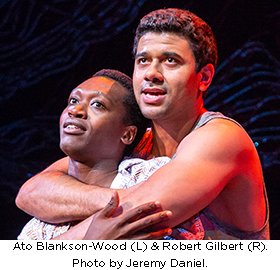Of the six actors in The Rolling Stone, only Robert Gilbert has done a previous production of the drama. He played Sam, the biracial doctor arrived in Uganda from Northern Ireland, in 2015 at the Royal Exchange in Manchester, England. So as I took a seat in his dressing room the other day I could not help leading with: what have you learned about your character this time?
“I’ve come to realize that Sam is less innocent than I originally thought he was,” Gilbert said. “He thinks he loves another person – Dembe. And he feels a responsibility toward Dembe’s well-being. But this time I got to look at Sam more closely and see his flaws more.”
Gilbert, who attended drama school in Liverpool for three years before moving to London to start his acting career, observed that “when I did the play for the first time it was brand-new. We had a lot of changes coming at us and I didn’t have a chance to see the character as solidly as I have here in New York.” He added: “As originally written, Sam was white. He became biracial.”
Gilbert himself is biracial: he has an African-American father and a white English mother. “My parents separated when I was very young. My father was in the Air Force. I got used to moving around a lot and meeting new people and learning to figure things out fast. I was an only child, and I spent a lot of time around adults. I learned how to please by entertaining them.”
Learning to entertain provided an early formation for performing. So did the fact of accents. “When I was a kid,” Gilbert said, “I had an American accent when I was with my father and an English accent when I was with my mother. I did that until I was 17.”
Gilbert holds dual citizenship, and he has performed on both sides of the Atlantic. He was in the Royal Shakespeare Company productions of the Bolingbroke plays that came to the Brooklyn Academy of Music in 2016, and he did Nick Payne’s Constellations at TheaterWorks Silicon Valley in Palo Alto, California.
Gilbert appeared at the National Theatre, in London, in Network, starring Bryan Cranston, and Cranston appears in a short film, Real Thirsty, that Gilbert has written and directed.
Also at the National: Gilbert’s first professional gig. It was a production of J.T. Rogers’ Blood and Gifts, a magnificent drama that was done subsequently at the very theater where The Rolling Stone is now playing: the Mitzi E. Newhouse.
Gilbert said that both the Royal Exchange and the Newhouse are spaces well-suited to The Rolling Stone. “The Royal Exchange is in the round and here we have an audience on three sides. Everywhere you look you feel closed-in. That’s very appropriate to a play that’s about pressure – societal pressure, family pressure.”
Although The Rolling Stone is more concerned to explore the pressure a social issue, homophobia, exerts on a family than on the exploration of how that homophobia came about in a larger sense, Gilbert could not help discussing the core of the drama both personally and politically: fear.
“Fear can drive the ideology of hatred and make it difficult to dislodge, especially if the fear has become familiar. If you admit to your peer group – in the case of the play: your family or your congregation – that you were mistaken in your belief they may say: how can I trust you now with anything? You presented yourself as an authority and now you’re saying you were fallible. If the family in The Rolling Stone survived I imagine that these would be some of the issues in the sequel.”
Brendan Lemon is the editor of lemonwade.com
